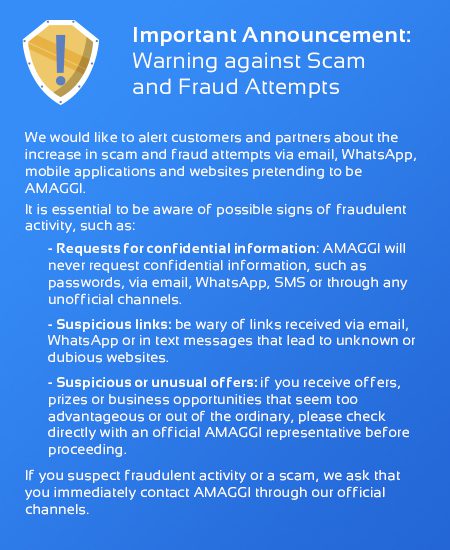Money laundering prevention policy
1 OBJECTIVE
1.1 Scope
This document applies to all AMAGGI business units in Brazil and abroad.
1.2 Alterations New policy.
2 DEFINITIONS, TERMINOLOGY AND ACRONYMS
Money Laundering: Law No. 9,613, of March 3, 1998, which was amended by Law No. 12,683, of July 9, 2012, which deals with crimes of “laundering” or concealment of assets, rights and values, brings the definition of such a crime in its article 1, as the act of concealing or disguising the nature, origin, location, disposition, movement or ownership of goods, rights or values arising, directly or indirectly, from a criminal offense.
Cash: Banknotes and coins. Also called physical money, banknotes, or paper money.
3. GENERAL
Money laundering represents a significant threat to the development of society because, behind this action, there may be several other crimes, such as corruption, drug trafficking, illegal gambling, tax evasion, payment of kidnappings, grand thefts and smuggling of goods, among others.
3.1. Guidelines
It is AMAGGI’s obligation to conduct business with ethics and integrity and comply with current legislation.
Therefore, employees are prohibited from engaging in any activity configuring or collaborating with money laundering.
Therefore, everyone is obligated to prevent, combat, and prohibit any activity related to money laundering.
Therefore, all payments must have a defined, transparent, proven, and traceable origin.
For this reason, it is strictly forbidden to make payments to business partners in cash, except for the use of a fixed cash fund, which is regulated by a specific procedure established by the company. Although payment in cash per se does not constitute an illicit act, such prohibition aims to protect AMAGGI against any eventuality and must be observed by all.
3.1.1 Obligations
Mainly in the exercise of functions related to negotiation, payments, receipts, and commercial and financial activities, everyone must comply with the following guidelines:
a) Not to carry out operations of any kind with cash receipts (except for operations permitted in a specific policy);
b) Not carry out any commercial or financial operation that is not transparent and justified;
c) Not carry out operations with persons or entities that cannot prove the origin of the money involved;
d) Not transfer funds through anonymous current accounts or linked to fictitious holders;
e) Report to your immediate superior whenever one (or more) warning signs appear, as per item 3.1.2;
f) If there is a suspicion of violation of this procedure, immediately notify the Compliance department or use the AMAGGI Confidential Channel.
3.1.2 Warning Signs
Within the scope of relations with public entities, AMAGGI’s dealings with government officials, public agents, public authorities, and regulatory agencies, among others, must be based on transparency and ethics so that integrity and sustainable relationships are ensured.
AMAGGI does not accept the practice or any act that constitutes a crime or jeopardizes its image or its conduct, especially regarding situations that may constitute crimes of money laundering, financing of terrorism, unfair competition, corruption, and other similar criminal practices.
In the exercise of their functions, all employees must be alert in case there are any signs that demand greater care before approving or concluding activities. In this Policy, they are identified as “warning signs” and must, when they appear, be immediately communicated to the superior and/or the Compliance department. These are:
a) Atypical or extremely complex hiring structures;
b) Fractionation of the service into several stages, with no apparent advantage;
c) Payment in cash or from unidentified accounts, either in Brazil or abroad;
d) Resisting the provision of information necessary for starting a relationship or updating the registration, offering false information or providing information that is difficult or costly to verify;
e) Request for non-compliance or action to induce employees not to follow regulatory or formal procedures for carrying out an operation;
f) Information on the same residential or business address by different individual persons, without demonstrating the existence of a family or business relationship.
Employees who act on behalf of the company before public institutions must know and carefully observe the content of the legislation that deals with corruption, money laundering and free competition, avoiding incurring in situations that may be characterized as violations of these rules.
3.1.3 Non-compliance
Failure to comply with the guidelines of this procedure may be considered misconduct and the case will be analyzed by AMAGGI’s Compliance department and by the Ethics and Conduct Committee.
4 RESPONSIBILITIES, EXCEPTIONALITIES AND GENERAL PROVISIONS
All employees are individually responsible for ensuring compliance with this document in conjunction with AMAGGI’s Code of Ethics and current legislation and regulations.
Any non-compliance with the guidelines described herein must be reported through AMAGGI’s Confidential Channel on 0800 647 0004 or on the website https://canalconfidencial.com.br/amaggi.
It is the responsibility of immediate managers to ensure that their team receives the necessary guidance to meet the requirements in this document.
5. REFERENCES
• Law nº 9.613/98, which deals with crimes of “laundering” or concealment of assets, rights and values.
• Anti-Corruption Legislation Law 12.846/13 and its decree 11.129/22
• FCPA (Foreign Corrupt Practices Act)
• UKBA (United Kingdom Bribery Act)
• PG-0001 – AMAGGI’s Integrity Policy
• AMAGGI Code of Ethics and Conduct.

